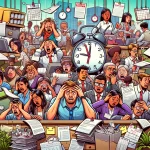Last Updated on February 26, 2024 by Daniel Boyce
If you’re burned out at work, you often don’t even feel like going back to work each day. There are many times you’ll even begin to find a way to get out of going to work.
Burnout can come from a mixture of work and personal stressors. It can be mentally and physically exhausting. If you’ve ever experienced it, it’s not a great feeling.
According to Gallup, 1/3 of all employees feel burned out at work very often. It’s a common occurrence that everyone is starting to recognize and become more aware of.

How do you know if you are burned out at work? How does it feel and what can it do to your body? And how do you handle it and get back on track? We will answer these questions and more in this article.
What is Burnout?
The term “job burnout” refers to a state of physical, mental, or emotional exhaustion. There are three main types of burnout: occupational burnout, personal burnout, and situational burnout.
Occupational burnout occurs when employees experience high levels of stress due to their job duties.
Personal burnout happens when people become overwhelmed by the demands of life outside of work.
Situational burnout is caused by working under extreme conditions such as unsafe environments or long hours.
The WHO defines burnout as, “Burn-out is a syndrome conceptualized as resulting from chronic workplace stress that has not been successfully managed.”
Employees who suffer from burnout often report feeling emotionally drained, irritable, and frustrated, as well as experiencing symptoms like insomnia, stomach ulcers, headaches, fatigue, and muscle aches. Burnout can lead to a loss of productivity, poor performance, absenteeism, and even suicide.
You could be working in a dysfunctional workplace where there are no clear lines of communication or accountability. Or maybe you’ve been put into a position where you feel undervalued or undermined by your peers or superiors. Either way, you’re likely to feel stressed out and overwhelmed.
Working long hours without breaks, or spending too many days away from home, can lead to exhaustion and feelings of being overworked. And if you’re juggling multiple jobs, that can add to the pressure.
How to Spot Burnout
When it comes to burnout, we tend to think of it as something that happens to people in stressful jobs like doctors, lawyers, teachers, and firefighters. But there are many ways to experience work-related stress, and some of those methods might surprise you.
You’ve probably heard that tiredness is one of the most common signs of depression. And if you’re feeling stressed, fatigue could be another sign that you’re suffering from work-related stress.
Fatigue isn’t just a symptom of depression; it can also happen because you’re working too hard. When you’re fatigued, you’re less likely to want to accomplish tasks, and you’ll find it harder to concentrate and pay attention. You may even feel irritable or angry when you get home.
Burnout is different than being tired. A combination of physical and mental weariness makes you feel exhausted all day long. There has been a 77% increase in the number of employees that are burned out.
Burnout can make you feel anxious, depressed, and angry. It can also cause problems sleeping, eating poorly, and having trouble concentrating.
What Are the Signs of Being Burned Out at Work?
Today, experts say burnout typically occurs when too many demands are placed upon people without enough resources to meet those demands. This exploitation and imbalance lead to feelings of frustration, anger, and helplessness.

Recognizing the signs can help identify what type of burnout you are dealing with. In fact, it’s important to be aware of the different types of burnout because each one requires a slightly different approach.
Gastrointestinal Problems
If you feel like you’re constantly getting stomach aches, diarrhea, or constipation, you might be suffering from gastrointestinal issues. These symptoms can indicate that there is something wrong with your digestive system. If you notice frequent bloating, gas, or cramping, you could be dealing with IBS (Irritable Bowel Syndrome).
High Blood Pressure
WebMD defines high blood pressure as having systolic blood pressures above 140 mmHg and diastolic blood pressures over 90 mmHg. This is considered prehypertension. People whose blood pressure is consistently elevated throughout the day are likely to deal with hypertension.
Poor Immune Function
Getting sick more frequently isn’t just annoying—it can put your health in jeopardy. A study published in the journal Health Psychology found that people who regularly experience colds and flu tend to have lower levels of antibodies against those viruses. Antibodies are proteins produced by our bodies to fight off infections. When we don’t produce enough antibodies, we become vulnerable to diseases.
Mental Health Issues
Symptoms of burnout include anxiety, depression, anger, and frustration. People who suffer from burnout tend to become cynical toward others and even themselves.
Exhaustion
Probably the more common symptom of burnout is exhaustion. Everyday activities become much more challenging, especially in social situations.
Lots of people experiencing burnout can have poor sleep quality due to some of the physical and mental symptoms. This will only amplify the exhaustion symptoms and make it seem like you are in a cycle you can’t escape.
Burnout is not something that just happens to you. It’s a result of your actions or lack thereof. You need to take responsibility for yourself and what you do with your life. If you don’t feel good about yourself, then you won’t be able to help others.
7 Tips to Help if You’re Burned Out at Work
We are all human. We all experience stress, frustration, boredom, and exhaustion. Sometimes we feel like we just want to give up. But it is important to remember that we are responsible for our well-being. If we don’t take care of ourselves, no one else will. Here are some tips to help you cope with job burnout:
1. Take breaks.
When you’re feeling overwhelmed, step away from your desk and go for a walk around the block. You’ll return refreshed and ready to tackle whatever needs doing next.
2. Make sure you’re getting enough sleep.
Sleep deprivation makes us cranky, irritable, and prone to making mistakes. A good night’s rest helps keep us sharp and focused throughout the day.
3. Be realistic about your workload.
Don’t try to do too much. Set reasonable deadlines and priorities. Then stick to them.
4. Get support.
Ask for help. Talk to your manager, colleagues, friends, and family. They can offer advice, encouragement, and perspective.
5. Find ways to relax.
Do something fun. Go out for lunch. Read a book. Watch a movie. Play video games. Listen to music. Exercise. All of these activities provide mental stimulation and release endorphins, chemicals that make us happy.
6. Keep track of how you’re feeling.
Write down what’s bothering you. Is there anything you can do to improve things? Are you having trouble sleeping? Are you stressed about money? Do you find yourself constantly thinking about work? These are signs that you might be suffering from job burnout.
7. Know your limits.
If you’ve been working long hours, it’s important to know how many hours you can put into one day. Ask yourself whether you’re doing what needs to be done, or whether you’re just working to avoid boredom.
If you spend most of your days working, ask why. Is it necessary? Are you avoiding something else?
Burnout: Recognize, Treatment, and Prevention
Burnout is real. We’ve all experienced it at some point in our lives — whether we’re working too hard at something we don’t care about or are just feeling overwhelmed. While burnout isn’t always caused by stress, many people find themselves dealing with stress while trying to deal with burnout.

There are many things the employee can do to prevent getting burned out at work. But the responsibility also falls on the employer to prevent burnout. Here we focused on the individual because that’s what we can control. But a toxic workplace environment will ultimately lead to these same feelings of burnout.
Burnout occurs when you feel overworked, underappreciated, and overwhelmed. You work too much and don’t take enough breaks. Your workload exceeds what you can handle. You feel like there aren’t enough hours in the day to accomplish everything you want to do.
The good news is that burnout doesn’t have to happen to you. You can prevent burnout or recover from it without taking extended breaks from work or quitting altogether.

Daniel Boyce, founder of AwareRecruiter.com, brings a diverse background in health, fitness, sales, and recruitment to career development. He’s passionate about helping professionals overcome workplace challenges and succeed in new roles. Daniel’s vision for AwareRecruiter.com is to create a comprehensive resource for career growth and satisfaction.

